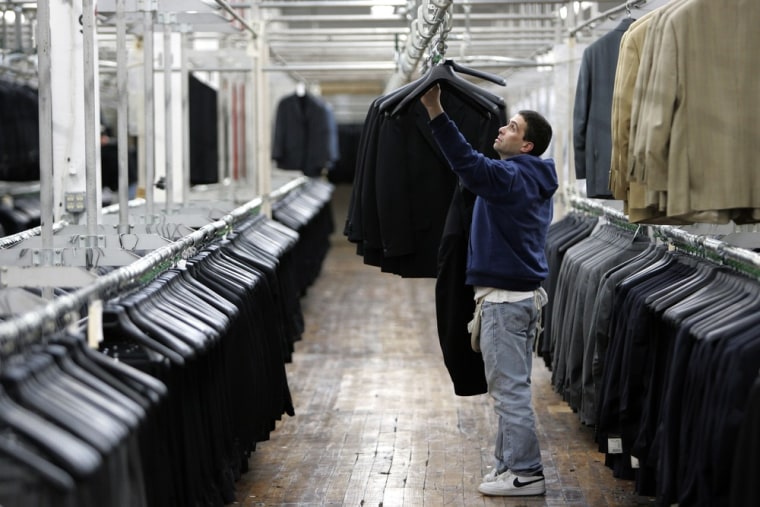When it comes to interview attire, the conventional wisdom holds that you dress for the job you want. But in this tough job market, male job seekers may be well-advised to wear a formal business suit to the interview no matter what the prospective position.
The fiercely competitive job market and a backlash against "business casual" attire that has been loosely interpreted to mean "sloppy dressing" has made it more important than ever for men to take a page from their female counterparts and make interview fashion a priority, said Carolyn Thompson, an executive recruiter and coach.
“I would encourage any man to wear a suit, even if you’re applying for a job at McDonald’s,” she said.
While women have a wider variety of options, the choices are limited for men. The best option is a nice tailored dark suit, a white shirt and a solid tie, according to many hiring managers and recruiters.
That could set you back at least $500 or more, but there are ways to cut corners, and the investment will be worthwhile if it makes the difference in getting a new job. Of course, you still want to make sure you have a great resume and elevator pitch.
The advice on business suits stands even if your prospective employer allows workers to wear flip-flops and shorts to work, hiring managers say.
“I definitely give a man brownie points for coming to the interview in a suit and tie,” said Risë Birnbaum, CEO of marketing firm zcomm in Bethesda, Md. “Despite the fact that zcomm offers a casual workplace, unless we are hosting clients, I think the extra effort on the part of the job seeker goes a long way.”
Dave Hatter, owner of Cincinnati–based Libertas Technologies, who is in hiring mode, said he would consider hiring an applicant who didn’t wear a suit, but any candidate who dressed more casually “would start at a very significant deficit. They should wear a suit.”
The “what to wear” conundrum seems to be harder on men these days, notes Roy Cohen, a career counselor and author of “The Wall Street Professional's Survival Guide."
“As clothing options have changed for men — casual Friday has morphed into casual every day — I’ve seen increasing uncertainty as to what is considered appropriate interview attire,” Cohen said.
The best way to find out what’s appropriate for an interview, he said, is to ask about “the prevailing dress code” at the prospective employer. “If you don’t know, just ask: ‘How do candidates typically dress for interviews here?’”
If you don’t want to ask, or are unable to find out, wear a suit, advised Barbara Patcher, a business communications expert.
“When there’s a lot of competition, a candidate’s clothing choice can give him an edge,” Patcher said. “Wearing a suit sends a message that the candidate takes the interview and the potential job seriously.”
Jane Durant, a partner with staffing firm Winter, Wyman, said there is only one exception when it comes to men wearing suits for interviews — and that’s when a hiring manager explicitly asks the candidate not to wear one.
She recalled one job candidate who worked for a major corporation who ignored her advice to wear a business suit to a job interview.
"He, on his own, decided to wear a sports jacket and a collared shirt with no tie because he thought that was the better choice," she said. "The hiring manager got in touch with us right after the interview and said he had a real problem with our candidate not wearing a suit. [The company] passed on the candidate in large part due to what he wore to the interview.”
And don’t think you can get off the suit hook if a prospective employer asks for a video interview instead of a face-to-face one, said Brandi Britton, senior regional vice president for OfficeTeam, an administrative staffing firm.
Hiring managers conduct interviews using video technology for several reasons, she said.
“They’re looking to see if you’re a good fit, but they’re also evaluating your appearance,” Britton noted.
Unfortunately, suits are expensive, especially for men who are unemployed, working part-time, furloughed or just having trouble filling up the gas tank. A recent story in The Wall Street Journal said $500 to $700 is the new sweet spot for suits. At that price a suit should include features "once found typically on more expensive suits" such as fine Italian fabric.
Still, that price range may be out of reach for someone surviving on $295 a week in unemployment benefits.
Several menswear companies have participated in suit drives for unemployed men, including Men’s Wearhouse. Clever shoppers can also turn to eBay, consignment shops or thrift stores, but beware of suits that are worn, discolored or pilling, said Erika Chloe, CEO of fashion consulting firm My Image Expert.
“I would also check the quality of the fabric and the fabric's weight; and [I would] make sure I’m getting the right suit for the right season,” she added.
The key to a great suit is fit. That may mean you need to get a tailor or your local dry cleaner to make alterations.
No suit is complete without a tie, and — sorry, guys — most hiring managers recommend the neck adornment for interviews.
Greg Shugar, founder of TheTieBar.com, suggests steering clear of novelty ties and going for a solid maroon, red, or light blue tie not narrower than three inches, or three-and-a-half if you’re on the heavier side. If you want to show some of your personality you can a purple or green tie, and also go for crisp geometric shapes, he said.
“The tie should be consistent with who you are,” he added.
